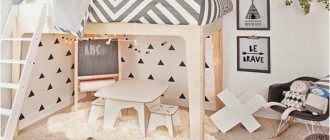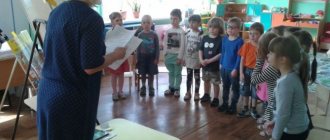Summary of work activities in the middle group. Lesson plan (secondary group)
Summary of labor activities in the middle group.
Topic: “Cleaning the group room.”
Type: economic and household work.
Program content:
Goal: To develop in children the ability to work in a team.
Educational: To instill in children a positive attitude towards work, a friendly attitude towards each other, a caring and attentive attitude towards others.
Educational: Teach children to distribute work among themselves in a team.
To consolidate children's knowledge about labor processes: caring for plants, dusting.
Developmental: Develop the ability to work carefully and bring the job started to the end.
Equipment: basins with water, rags, aprons, watering cans, cat toy.
Planned result: as a result of collective household work, children have formed a value-based attitude towards their own work and the work of their peers; children should understand that after their work the group became clean, light and beautiful.
Methods and techniques: Verbal play (conversation, explanation), visual
(showing a method of action), practical.
Progress of collective work:
Stage 1. Work motivation
Educator: Guys, today a fox came to visit us and brought you some kind of surprise. But in order to get it, you need to work hard. The fox noticed that there was dust on the shelves in our group and gave us the task of cleaning our group so that it would be clean and beautiful. But that is not all. Our plants are not doing well at all. Why do you think? (do not water). That's right, guys - our plants don't have enough water to feed them. Because of this, they got sick. The fox didn’t like it at all, she wants to see how we can water them.
Shall we complete our guest's tasks? (Yes). Then now we will decide who will carry out what task. And the fox will sit on a chair and watch our work.
Stage 2. Organization of labor activities.
The teacher brings out pre-prepared material - aprons, rags, basins, watering cans - and puts everything on the table.
Educator: Guys, let us divide into 2 teams. And before work, let's remember what and how we will do. We take the watering can in two hands (one hand by the spout, the other by the handle), pour half of the watering can in the toilet room, bring the end of the watering can's spout to the pot so that the spout of the watering can touches the pot and carefully tilt the watering can for watering. You need to water until water appears in the saucer under the pot. (teacher demonstration).
We put the rags in the water, wring them out, straighten them and wipe the shelves, chairs, tables so that there is no dust left anywhere (teacher demonstration). Guys, don’t forget that when you work, you need to be polite, not quarrel and help each other.
So, let's start tidying up. Don't forget to wear aprons to avoid getting your clothes wet. (The teacher approaches the children one by one, observes, controls, helps them work, and reminds them of the methods of work.)
Stage 3. The result of the work.
(The teacher offers to finish the work and start cleaning up the equipment. Helps to find a place for the equipment, fold it neatly).
Educator: Guys, let's now see what we got. Look, and the fox hurries to look at the work done. (The teacher brings the toy to his ear.) The fox says that you did a very good job and now wants to know why you did it? What benefit will our work bring? (children's answers). She really liked our work. How you carefully and accurately watered the plants, how cleanly you wiped the dust off the furniture. What hardworking guys! For this the fox wants to treat you
sweet gift. (The teacher brings out sweets). For your efforts, she gives you these delicious candies.
(teacher distributes treats)
Guys, it’s time for the fox to go home to her kittens, but she promises to come visit us again soon. (Children say goodbye, the fox leaves)
MAGAZINE Preschooler.RF
Notes on organizing collective work Topic: “Let's teach Masha to work” middle groupPrepared by: teacher Tishina Irina Andreevna Municipal budgetary preschool educational institution general developmental kindergarten No. 10 “Yolochka” , Moscow region, Ozyory
Contents: washing toys, furniture and indoor plants (2-3 units).
Educational field: Social and communicative development.
Program goals and objectives:
- developing a child’s positive attitude towards work
- develop work skills and improve them
- develop skills in organizing the work process
- to form friendly relations between children and each other, teach them to evaluate the activities of others, and make comments.
Organization: subgroup. I put on aprons for the children and myself in advance, and prepare the subject-development environment.
Equipment: three basins with water, 5 rippers, a watering can with water, rags and aprons according to the number of children.
Progress of work.
Introductory part:
a) To focus children on the social significance of work and responsibility for its implementation - we will arrange a bath day for our group. And for this we need to wash the toys, tables and chairs, flowers.
I gather the children on the carpet.
A surprise moment: the doll Masha came to visit
— Educator: Who came to us? What is your name? What are you doing in our group?
- My name is Masha. I heard that today is your bath day. While you were sleeping, I decided to help you clean up, I cleaned almost everything.
— Educator: Why are you so dirty? How did you clean up, nothing has changed in our group. Really, guys? (Truth)
- Well, I wiped the dust off the table (wipes the table with his hand)
— Educator: What are you talking about, who wipes the dust like that!
- So how should it be? (asks the children)
“With a napkin,” the children answer.
— Educator: How did you wipe the flowers?
- Why wipe them, here (blows on a flower), and everything is ready.
- This is absolutely no good. The guys need to teach Masha how to clean properly. Sit down Masha and watch carefully, now the guys and I will teach you how to clean up properly.
b) Explanation and demonstration of how to perform:
Educator: Guys, let's remember how to wash toys?
How to wash the chairs? (wash the back, legs, seat).
How should you care for indoor plants? (Wipe large leaves by carefully placing the leaf on your palm and wiping with the other hand) We do everything carefully and carefully!
c) Educator: We have a lot to do, and for this I will divide you into teams and choose the leaders. They will ensure that all tasks are completed and provide assistance.
(I specify the place of work of each link, what it will do; the emotional attitude towards responsible and high-quality performance.)
Check if you have everything you need to work.
Main part:
a) training in basic labor planning, i.e. teach children to organize their work:
— Educator: Let's see what is needed for work?
teach children to plan tasks:
-Where do we start? How will we do it? What will you do next? How? (if you need to clarify the actions).
teach managers to monitor and evaluate work:
-What will you check?
-How will you finish your work? (Target children, control that they check themselves during work and do not make mistakes).
-Remind you to remember to put everything back in its place after work.
b) Techniques for managing the work of individual units of children:
-example of an adult, demonstration, reminder, encouragement, explanation; example of children, organizing mutual aid for children, celebrating good deeds of children, encouraging mutual aid; bring the job started to completion; learn to work together and carefully.
c) Completion of the labor process: cleaning the workplace (leaders supervise the cleaning).
a) Summarize the work as a whole and by subgroups, note the importance of collective work;
b) Evaluation of the work of units and individual children: / evaluation is educational and encouraging. /
— Educator: What did your unit do and how? Who worked hard? How and in what ways did you help each other?
- involve children in assessing the work of another level (has everything been done, has the workplace been cleaned)
(fairness and friendliness of the assessment; we discuss in a tactful manner shortcomings in the work).
Well done boys! Masha has prepared riddles for you:
On a dark night, on a clear day, He fights with fire. In a helmet, like a glorious warrior, he hurries to the fire. (firefighter).
He lays bricks in a row, builds a kindergarten for the children, not a miner or a driver, but builds a house for us. (builder)
He knows the traffic rules without a doubt. He instantly starts the engine and rushes off in the car. (chauffeur)
Who in a clean white robe gives us vaccinations quickly? The kind one saves us from illnesses and failures... (doctor)
He flies high, soars above the ground easily. A brave guy lands a plane... (pilot)
Well done! Tell me what was said in the riddles (About professions.)
Final part:
- What did we do today?
— What did you like most?
-Now let's say goodbye to our guest.
| Next > |
Work progress:
1 part :
Children, nursery teachers
asked us to help them wash the toys and doll dishes, wash the linen and clothes for the dolls, and dry the building material. Let's do something nice for the kids?
I invite children to answer the following questions:
What proverbs about work do we know?
?
How should you wash plastic toys? (Wash first and then dry.)
What needs to be done to get the dolls' laundry cleaned? (First wash with soap, then rinse, dry and iron.)
I distribute the children into groups
, assign responsibility, determine the scope of tasks.
I advise the children to distribute the work within each group
.
I remind the children that they cannot be distracted, that any task must be completed carefully. I remind you that in order to complete the task, you need to help each other.
Part 2: Practical work.
I invite the children to go to their workplaces, before starting to work, I establish rules with the children, the observance of which improves the quality of work
. I remind the children that to start working they need to put on aprons.
during work
how the children distribute responsibilities, what kind of relationships develop, whether they skillfully use the equipment, and provide individual assistance.
Part 3: Summing up the work.
After work, I make sure that the children put all the equipment back in place and put things in order in their work areas. I invite you to admire the result of the work.
Involves all children in analyzing and evaluating work performance. Asks them the following questions:
Why did you manage to get the job done quickly and well?
Which of you did your comrades help?
I praise all children words:
I'm glad you worked together. I think kids will be happy to have clean toys.
I give all children an assessment, pointing out their shortcomings and shortcomings.
Publications on the topic:
Summary of household work for preschool children in the senior group Topic: “Let's help the doll Masha wash the house” Goal: To form the habit of maintaining cleanliness and order. Objectives: Educational: -Form.
Abstract of the OOD “Collective Household Labor” in the preparatory group of the Municipal Budgetary Preschool Educational Institution, Combined Kindergarten No. 5 “Golden Key” Abstract of the OOD “Collective.
1. Type of work: household (preparing vinaigrette) 2. Tasks: learn how to properly cut vegetables, use a cutting board,.
Summary of a lesson on speech development in the senior group. Compiling a collective story “Letter to a Soldier” Program content: 1. Expand children's ideas about military service. 2. Learn to compose a creative story in the form of a letter and be able to follow it.
Summary of household chores in the middle group “Let's help the kids wash their handkerchiefs!” GOAL: moral, psychological and practical preparation of children for conscientious work, formation of the principles of hard work. OBJECTIVES: 1. teach.
Summary of household work in the second junior group “Let's help Grandma Fedora” Goal: To deepen children's interest in household work, to create a desire to take part in it as much as possible. Objectives: Teach children.
Summary of collective work on caring for indoor plants in the senior group Summary of collective work on caring for indoor plants in the senior group Form of organization of labor activity: collective.
Fedora: - I didn’t like to work: washing dishes and floors, tidying up all my things. Now the trouble has happened... Educator: -Who are these guys? Children: - Fedora. V. — From what fairy tale did Fedora come to us? Children: - Fedorino's grief. V. - That's right, who wrote this fairy tale? Children: - Korney Ivanovich Chukovsky. Fedora: - Hello, guys. Educator: - Hello, Fedora, why didn’t you wash the dishes, wash your things or tidy up, that means you were lazy. Guys, is it good to be lazy? Children: - No.



